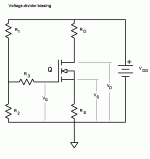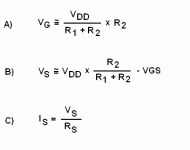Good thing he published it for free then, isn't it? It's all in the white papers...and here.
I find it easier to just go ahead and build something than to obsess over arcane details. For instance, all the theory, PSPICE, and book learning in the world won't prepare you for that IRF P-ch glitch. It's just kinda there. The only way you're going to find out about things is to go ahead and bump your nose into them.
Grey
I find it easier to just go ahead and build something than to obsess over arcane details. For instance, all the theory, PSPICE, and book learning in the world won't prepare you for that IRF P-ch glitch. It's just kinda there. The only way you're going to find out about things is to go ahead and bump your nose into them.
Grey
bump your nose...
...and I've got the band-aids.
I just want some basic info located in one easy to access location. That's all. Nothing fancy.
Just show me how to manipulate the formulas, just like they do in my electronics publications. If everything's the same, then I'll be all the wiser. But, if there's a different way to handle FETs, then I'd like to know that too.
There's something about reading simple black and white.
I'm going to find a MOSFET publication. I just thought this forum would be more entertaining.
John🙂
...and I've got the band-aids.
I just want some basic info located in one easy to access location. That's all. Nothing fancy.
Just show me how to manipulate the formulas, just like they do in my electronics publications. If everything's the same, then I'll be all the wiser. But, if there's a different way to handle FETs, then I'd like to know that too.
There's something about reading simple black and white.
I'm going to find a MOSFET publication. I just thought this forum would be more entertaining.
John🙂
carpenter said:Like I said in another post, I'd pay a hundred bucks for an FET book written by Nelson Pass.
John😀
carpenter,
moderators of diyaudio
and others
There is way to collect such knowledge already present in different topics
and put it into one
STICKY: The MOSFET Glossary, Guidelines and Formulas
like we did it in another forum!
.
Sticky: The Gainclone Glossary (Main Thread) - This topic is locked you cannot edit posts or make replies.
Sticky: Gainclone Glossary (Development Thread) - Here you can post suggestions, info you found
.
The Gainclone Glossary
is a good collection of knowledge in the topic of Gainclone Building.
It is in the form a glossary, dictionary.
Gainclone words, terms used and expressions, From A to Z.
This glossary was suggested by another member as a good help for first timers
to get into the jargon and quickly learn the basics about gainclone building.
On my suggestion, to avoid anyone to put anything, not 100% suitable or Off topic, into this glossary,
we made one open glossary development thread
and at same time made The Gainclone Glossary (Main Thread) Closed.
A couple of members with good general Gainclone knowledge and the forum owner ( Gregg Baker, I think his name is )
are the only one to edit and add new material into this topic.
###########
If we at www.diyaudio.com want to collect good rules / guidelines for MOSFET design
from this forum and put it into one topic
this could easily be done the same way.
There are plenty of such stuff, for sure!, by Nelson Pass, GRollins and many many other members with such valuable knowhow,
that has been posted into different projects/topics over the years!
###########
As mentioned, this way needs the cooperation of moderators
and possibly one or two other guys with good general MOSFET-knowledge ( maybe carpenter as he is really motivated for it ).
These will be given edit/post right in this topic:
The MOSFET Glossary, Guidelines and Formulas - STICKY and Closed
And they will, when they have some spare time, have a look at suggested stuff/contributions and copy good stuff from
MOSFET Glossary, Guidelines and Formulas ( development thread ) - Open for posters
into main thread.
Link to the good example of
Gainclone.com with The Gainclone Glossary
lineup
Good Audio Suggestions Lab
Lineup, you're idea is brilliant -- exactly what I hoped for. I'd be happy to assist any way I can.
I have motivation, but I'm not a electronics designer... yet. 😉 Give me another 20 years, or so. Ha.
John🙂
I have motivation, but I'm not a electronics designer... yet. 😉 Give me another 20 years, or so. Ha.
John🙂
The book I go back to often is named "Electronic Principles" published by McGraw Hill written by Malvino
I found this book used at Amazon.com for less than two bucks! New, this is a $135.00 publication. I also purchased this author's publication: Electronic Principles with Experiments; I got it for eight bucks.
Very cool stuff. Thanks Bryan,
John🙂
carpenter said:
I found this book used at Amazon.com for less than two bucks! New, this is a $135.00 publication.
Carpenter, Bryan, I graduated from DeVry Tech Inst. in '79. That was one of our text books
😀 😀 😀
Hi Car,
re post26 & 27.
your formulae are correct (at DC or low frequency).
Plug these into a spreadsheet to make the sums easy to manipulate.
You could plot a graph between the unknown Vgs and Is for various Vgs.
Tthen extract values from the datasheet to find the approximate current your circuit will flow D to S.
Then set up a little experiment to see if it matches the model.
re post26 & 27.
your formulae are correct (at DC or low frequency).
Plug these into a spreadsheet to make the sums easy to manipulate.
You could plot a graph between the unknown Vgs and Is for various Vgs.
Tthen extract values from the datasheet to find the approximate current your circuit will flow D to S.
Then set up a little experiment to see if it matches the model.
Hi Andrew,
Thanks for the input. I'm relieved to see that my brain works a little bit.
I don't know how to use Excel, but would love to have someone teach me 😉.
So much to learn, hopefully plenty of time,
John 🙂
Thanks for the input. I'm relieved to see that my brain works a little bit.
I don't know how to use Excel, but would love to have someone teach me 😉.
So much to learn, hopefully plenty of time,
John 🙂
in the spirit of the starting post of this thread, a good intro to depletion mode MOSFETs can be found in this EDN article
mlloyd1
mlloyd1
- Status
- Not open for further replies.
- Home
- Amplifiers
- Pass Labs
- MOSFET rules, formulas and guidelines

